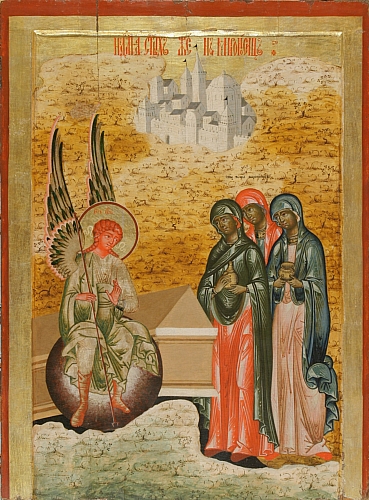Pastor Tom Johnson, April 26, 2015
 What
a sight for sore eyes and growling stomach! The hungry wolf looks at the sheep
and salivates. He sees a field full of tasty lamb. As the scout, the wolf will
survey his prey. He will quickly find out which sheep are weak and easy targets. He
will also count the cost of an attack. Is there another who has claimed these
sheep? Is it one or more of those hairless, bipedal humans? And if there is one
who has claimed them, do they look like a formidable threat? Look
at how the shepherd moves around. Does he have a commanding presence? Is there
a weapon in his hand? Is he a major obstacle? Or is he just another creature
who will scatter when howling and galloping into the hunt begins? Wolves
are masters at observing strength and weakness in their prey and those with
whom they may fight for their prey. It’s why many dogs, descendants of the grey
wolf, can smell a phony, threat, and danger outside the front door.
What
a sight for sore eyes and growling stomach! The hungry wolf looks at the sheep
and salivates. He sees a field full of tasty lamb. As the scout, the wolf will
survey his prey. He will quickly find out which sheep are weak and easy targets. He
will also count the cost of an attack. Is there another who has claimed these
sheep? Is it one or more of those hairless, bipedal humans? And if there is one
who has claimed them, do they look like a formidable threat? Look
at how the shepherd moves around. Does he have a commanding presence? Is there
a weapon in his hand? Is he a major obstacle? Or is he just another creature
who will scatter when howling and galloping into the hunt begins? Wolves
are masters at observing strength and weakness in their prey and those with
whom they may fight for their prey. It’s why many dogs, descendants of the grey
wolf, can smell a phony, threat, and danger outside the front door.
Today
is the wolf’s lucky day. The shepherd is a hireling—someone hired out—a
subcontractor—maybe even an apprentice—perhaps a new hire the first day on the
job—or someone from the shepherd temp agency. The
hireling does not own the sheep. His body language, attitude, and lack of
confidence is plain for even the wolves see.
When the hired hand sees the wolf, he may only see the silhouette of a wolf on the horizon, a furry face behind a bush, or two night-vision eyes in the black shadows. Generations of domestication has given the sheep poor eyesight. The shepherd is hired to be the eyes and watchman to look over the sheep day and night. But the confidence he sees in the wolves hungry and menacing eyes is no match for this shepherd who does not own the sheep. He quickly counts the cost. He does not own the sheep, so he has nothing to lose. The value of his own life outweighs the risk of losing the sheep. Self-preservation is his greatest concern. So he runs. The sheep left behind serve to slow down even a pack of wolves so that the hireling can make his escape. This is failure to do his duties, abandonment of his post, loss of all that was entrusted to his care, and cowardice.
The
hirelings are those entrusted with the care of God’s people, the sheep. These
are those in authority who cared more about maintaining their own power and
their own lives than they did the security and needs of those whom they served.
King
Herod is a hireling who fails to protect his subjects—especially this Jesus of
Nazareth—who comes into his throne room but whose support is scattered to the
wind when he sees the mob of wolves who want to have Jesus for breakfast. Pontius
Pilate is a hireling of the Roman emperor. He knows it’s wrong to condemn
Jesus. But when his wife has a dream and tells him to have nothing to do with
Jesus, his better judgment is also scattered to the wind. He hears the mobs
howl out “Crucify, crucify!” He washes his hands and runs away from the fight. The
history of the kings of Israel and Judah is filled with of kings who do what is
evil in God’s sight. They do what is right in their own eyes. Most do not rise
to the occasion of serving God and his people humbly and selflessly. Sadly,
and for the most part, that is the history of all nations that rise and fall.
Few will go once more into the fray for their sisters and brothers. Few will be
challenged and threatened with death and say, “Here I stand; I can do no
other.”
The really disturbing thing about our text is that we are
both sheep and wolves simultaneously. We are sinners and saints. We are lambs
as well as roaring lions. Sure, the devil may be the first to scout out his
prey, but the powers and principalities of this world and our sinful nature
follow his blood lust and hunger for power. We
are also part of the mob that cried “Crucify!” just as Peter reminds his
audience in our first reading. We have put Jesus to death by our violence, our
sin, our negligence, and our failure to love God and our neighbor as God calls
us to do.
“I am the Good Shepherd,” Jesus says. “The good shepherd
lays down his life for the sheep.” The Good Shepherd does not lose courage. The
Good Shepherd does not back down. The Good Shepherd does not cower or run but
stands his ground. The Good Shepherd holds the field in battle. The Good
Shepherd confronts evil directly, courageously, valiantly, and selflessly. The
Good Shepherd lays his life down as a warrior king in the confidence of his
power and purpose. The lamb who appears to be dying passively in the jaws of
the wolves is the Good Shepherd who confronts the devil, this fallen world, and
our sin. “I lay down my life in order to take it up again. No one takes my life
from me, but I lay it down of my own accord. I have power to lay it down, and I
have power to take it up again.” These are not the words of a hireling and a failure.
These are the words of the Good Shepherd and Savior. This is the Good Shepherd
to lays his life down and takes it up again to bring us forgiveness, life, and
salvation. Instead of running, he stands fast. Instead of preserving
his own life, he gives it for the life of the world. Instead of the sheep being
scattered, they are gathered. Instead of his mission being limited to his own
fold, he cares about those outside. Unlike the wolf who wants us to have us for supper, the Good
Shepherd has us for supper—he spreads a table before in the presence of our
enemies. He anoints our heads with oil. Our cup runs over. Surely goodness and
mercy will follow us all the days of our lives. And we will dwell in the house
of the Lord forever.


